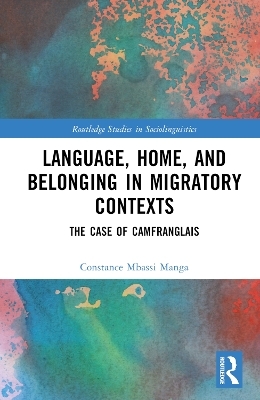
Language, Home, and Belonging in Migratory Contexts
Routledge (Verlag)
978-1-032-75092-7 (ISBN)
- Noch nicht erschienen (ca. Mai 2025)
- Versandkostenfrei innerhalb Deutschlands
- Auch auf Rechnung
- Verfügbarkeit in der Filiale vor Ort prüfen
- Artikel merken
Mbassi Manga adopts an integrated approach bringing together the lenses of Critical Discourse Analysis and Linguistic Ethnography to the analysis of data on Camfranglais (CFrA), a hybrid urban language form from Cameroon combining elements of French, English, Pidgin English, and Cameroonian vernaculars. Drawn from a discussion on interviewees’ accounts of the place and value of language in their life trajectories, and markers of identity, home and belonging in Facebook chats, the data analysis highlights CFrA's symbolic value and its role as an expression of a diasporic Cameroonian identity. The book concludes on the place and importance of non-official language use and other intracommunity cultural practices in the lived experiences of so-called migrants, as tools promoting well-being and positive integration in Western host societies.
This book will be of interest to scholars in sociolinguistics, linguistic anthropology, discourse analysis, and decolonial studies.
Trained as a translator and interpreter, Constance Mbassi Manga works in the Creative Language Services industry and in Higher Education. After getting a Masters in Research at Kings College, London, she completed her PhD at Lancaster University, UK.
Contents
List of Tables
List of Images
Transcription Conventions
Chapter 1 – Introduction and background
1.1 Introduction
1.2 What do we call Camfranglais?
1.3 My personal interest in CFrA
1.3.1 My relationship to CFrA and other non-standard codes in my repertoire
1.3.2 Reasons that led me to research CFrA
1.4 Background
1.4.1 Colonial history & the link with CFrA
1.4.2 How decoloniality fits in
1.4.3 CFrA in the diaspora
1.4.4 Relevance of the topic
1.4.5 Research question
1.4.6 Ontological and epistemological position
1.4.7 Theoretical framework
1.4.8 Overview of indexical transformations undergone by CFrA in this context.
1.5 Value & usefulness of the interdisciplinary lens to this topic
1.5.1 Introduction
1.5.2 (Linguistic) Ethnography
1.5.3 Online/digital ethnography
Introduction
Nomenclature
The online field, its context, and privacy
Insights from relevant online ethnographies
1.5.4 Critical Discourse Analysis
1.5.5 Decolonial approaches to CDA
1.5.6 Combining LE & CDA
1.5.7 Key points on data collection (on- and offline)
1.5.8 Life narratives as data
1.5.9 Researcher’s position and reflexivity
1.5.10 Data analysis – overview
1.6 Conclusion
Chapter 2. Key concepts
2.1 Theorising Cameroonian-ness
2.1.1 Diaspora
2.1.2 The deconstruction of diasporic Cameroonian-ness
2.2 Community
2.3 Home’ and ‘belonging’, identity and the migratory experience
2.3.1 (Home and) Belonging
2.3.2 Identity
2.3.3 Migratory experience
2.4 The functions of language
2.5 Translanguaging & its relevance to the project
2.6 Conclusion
Chapter 3 – Historical and socioeconomic context
3.1 From colonial era to independence
3.2 Language ideologies of the new Cameroonian state
3.2.1 From independence to the late 1980s
3.2.2 From the 1990s onward
3.2.3 Practical example – Camfranglais in pop culture
3.3 Main trends in the study of CFrA
3.3.1 Introduction
3.3.2 Trends in the study of Camfranglais: late 90s to mid-2000s
CFrA as a linguistic system
CFrA and other registers
CFrA as an unstable register
CFrA and official language ideologies
CFrA as a sociolinguistic asset
3.3.3 Trends in the study of CFrA: mid to late 2000s onward
Previous studies about the socioeconomic context of emergence of CFrA
Previous studies about CFrA as a language practice
Previous studies about CFrA and the diaspora
Identity in previous studies about CFrA
Home and Belonging in previous studies about CFrA
3.4 Conclusion
Chapter 4 – Skype conversations: Narratives and Diasporic identities
4.1 Introduction
4.2 The conversations
4.3 Brief vignettes of participants
4.3.1. Adam
4.3.2 Freddy
4.3.3 Lovely
4.3.4 Craig
4.3.5 Thalia
4.3.6 Manuela
4.3.7 Trish
4.3.8 Boris
4.3.9 Conclusion
4.4 Analysis – Introduction
4.4.1 Participants’ backgrounds and its impact on practices
4.4.2 Socioeconomic background
4.4.3 Age and time of arrival
4.5 Themes emerging from the conversations
4.5.1 Language and identity
4.5.2 Frenchness and Cameroonian-ness
4.5.3 Language and ‘race’
4.5.4 Language ideologies about CFrA
4.5.5 ‘Home and Belonging’
4.5.6 Insights from the conversations
4.6 Conclusion
Chapter 5 – Facebook Group – an online community built around CFrA
5.1 Introduction
5.2 Overview of Facebook features and their impact on the data
5.2.1 Affordances of participation
5.2.2 Affordances of space
5.2.3 Affordances of personal expression
5.2.4 Affordances of connection
5.2.5 Impact of Facebook features on the project
5.3 General description of the Group
5.3.1 Introduction
5.3.2 Organisation of the Group
5.3.3 Engaging with the Group
5.3.4 Data selection and download
5.4 Activity in the Group
5.4.1 Introduction
5.4.2 Member interaction
5.5 Analysis – Introduction
5.5.1 Overall content and style
5.6 Selected cases & themes
5.6.1 Diasporic migrant identity
Analysis
5.6.2 Community-building
Analysis
5.6.3 Cameroonian identity & Patriotism
PRINCE
Analysis
TEBO
Analysis
5.6.4 Metadiscourses about CFrA
Analysis
5.6.5 Insights from the Facebook chats
5.7 Conclusion
Chapter 6 – Findings and Conclusion
6.1 Introduction
6.2 Overall findings
6.3 Global significance of the case study
6.3.1 Links with the Sociolinguistics of migration
6.3.2 Links with the (updated) Sociolinguistics of diaspora
6.3.3 Links with Postcolonial theories
6.3.4 Why and why now? Timeliness and relevance
6.4 Limitations
6.5 Further areas of research
6.6 Final comments
Appendix
Index
| Erscheint lt. Verlag | 5.5.2025 |
|---|---|
| Reihe/Serie | Routledge Studies in Sociolinguistics |
| Zusatzinfo | 17 Tables, black and white; 1 Line drawings, black and white; 1 Halftones, black and white; 2 Illustrations, black and white |
| Verlagsort | London |
| Sprache | englisch |
| Maße | 152 x 229 mm |
| Themenwelt | Geisteswissenschaften ► Sprach- / Literaturwissenschaft ► Sprachwissenschaft |
| ISBN-10 | 1-032-75092-8 / 1032750928 |
| ISBN-13 | 978-1-032-75092-7 / 9781032750927 |
| Zustand | Neuware |
| Informationen gemäß Produktsicherheitsverordnung (GPSR) | |
| Haben Sie eine Frage zum Produkt? |
aus dem Bereich


